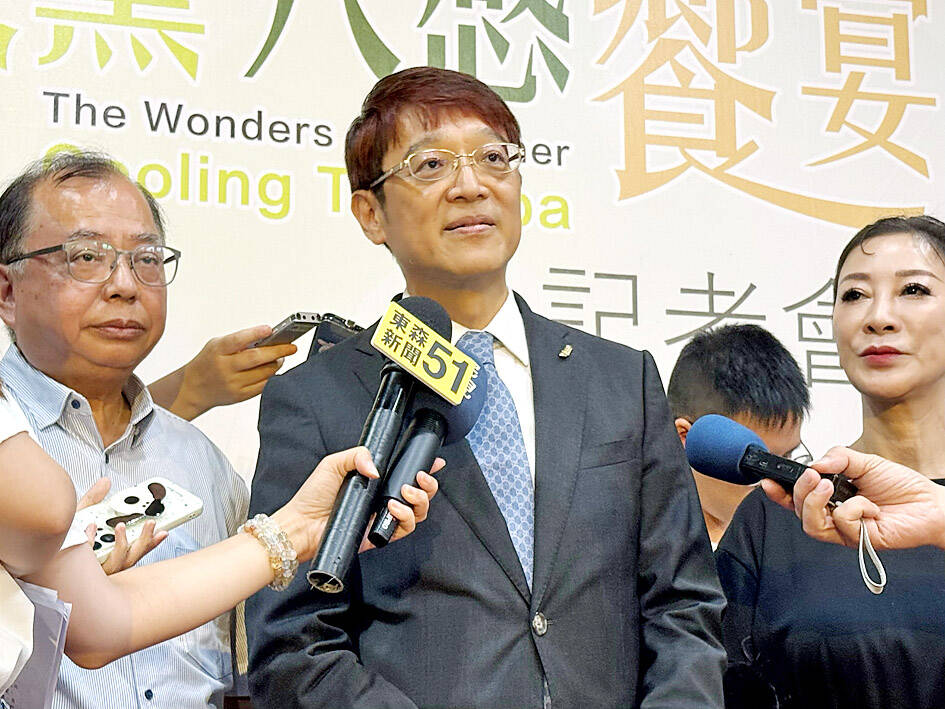The government would target the Indian corporate incentive market in a bid to reach its target of 10 million annual tourists to Taiwan, Tourism Administration Deputy Director-General Trust Lin (林信任) said yesterday.
However, to achieve that aim, direct flights to India need to resume, he said.
Flights were canceled during the COVID-19 pandemic and have not been relaunched, and this has made travel between the two countries not as convenient as before, Lin said.

Photo: Tsai Yung-jung, Taipei Times
In the interim, to spur tourism from India, the administration set up a Taiwan Tourism Service Office in Mumbai earlier this year, and participated in India’s business travel exhibition, he said.
“On June 20 this year, we invited operators from the Indian tourism industry to Taiwan for the first time,” Lin said.
Before the pandemic, one Indian enterprise originally planned to have 4,000 employees come to Taiwan, he said, adding that the plans had to be canceled due to COVID-19.
“Taiwanese electronics brands are also very popular in India, and there are many local suppliers. If an Indian business planned a trip to Taiwan, it would bring a lot of tourists,” he said.
Lin said that the Tourism Administration has been busy promoting incentive travel in many overseas markets, hoping to attract companies to travel to Taiwan.
“However, a big problem facing the Indian market in particular is that direct flights have not yet resumed, and that is something we will have to work on,” he said.
Separately, regarding tourism subsidies for domestic travel to earthquake-hit Hualien, Lin said that the details have yet to be worked out, but he encouraged the public to travel there more.
Asked whether Yilan would also be included as an eligible destination for subsidies, Lin said that it was unlikely.
Over the Dragon Boat Festival long weekend, Yilan’s booking rate is close to average, and its performance during the peak tourist season has been “very good,” he said.
“We will continue to monitor the situation and determine whether Yilan will be included,” he added.

The manufacture of the remaining 28 M1A2T Abrams tanks Taiwan purchased from the US has recently been completed, and they are expected to be delivered within the next one to two months, a source said yesterday. The Ministry of National Defense is arranging cargo ships to transport the tanks to Taiwan as soon as possible, said the source, who is familiar with the matter. The estimated arrival time ranges from late this month to early next month, the source said. The 28 Abrams tanks make up the third and final batch of a total of 108 tanks, valued at about NT$40.5 billion

Two Taiwanese prosecutors were questioned by Chinese security personnel at their hotel during a trip to China’s Henan Province this month, the Mainland Affairs Council (MAC) said yesterday. The officers had personal information on the prosecutors, including “when they were assigned to their posts, their work locations and job titles,” MAC Deputy Minister and spokesman Liang Wen-chieh (梁文傑) said. On top of asking about their agencies and positions, the officers also questioned the prosecutors about the Cross-Strait Joint Crime-Fighting and Judicial Mutual Assistance Agreement, a pact that serves as the framework for Taiwan-China cooperation on combating crime and providing judicial assistance, Liang

A group from the Taiwanese Designers in Australia association yesterday represented Taiwan at the Midsumma Pride March in Melbourne. The march, held in the St. Kilda suburb, is the city’s largest LGBTQIA+ parade and the flagship event of the annual Midsumma Festival. It attracted more than 45,000 spectators who supported the 400 groups and 10,000 marchers that participated this year, the association said. Taiwanese Designers said they organized a team to march for Taiwan this year, joining politicians, government agencies, professionals and community organizations in showing support for LGBTQIA+ people and diverse communities. As the first country in Asia to legalize same-sex

MOTIVES QUESTIONED The PLA considers Xi’s policies toward Taiwan to be driven by personal considerations rather than military assessment, the Epoch Times reports Chinese President Xi Jinping’s (習近平) latest purge of the Chinese People’s Liberation Army (PLA) leadership might have been prompted by the military’s opposition to plans of invading Taiwan, the Epoch Times said. The Chinese military opposes waging war against Taiwan by a large consensus, putting it at odds with Xi’s vision, the Falun Gong-affiliated daily said in a report on Thursday, citing anonymous sources with insight into the PLA’s inner workings. The opposition is not the opinion of a few generals, but a widely shared view among the PLA cadre, the Epoch Times cited them as saying. “Chinese forces know full well that